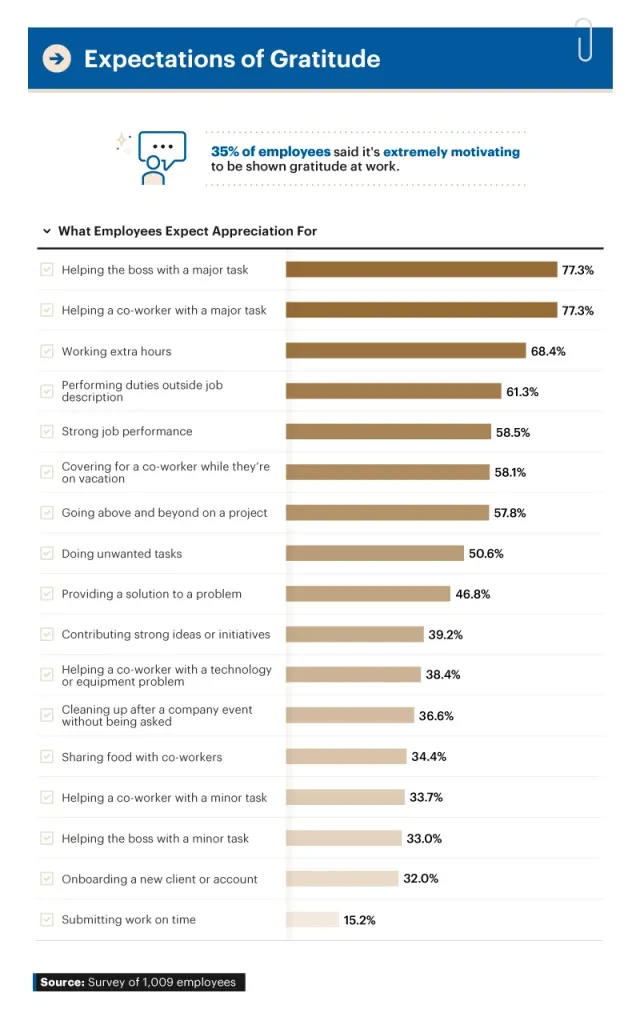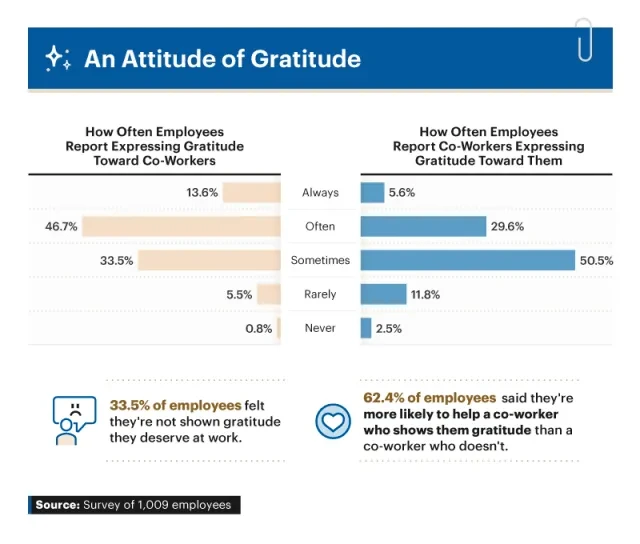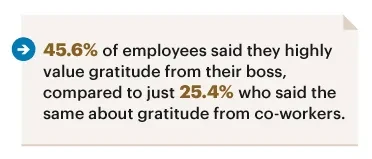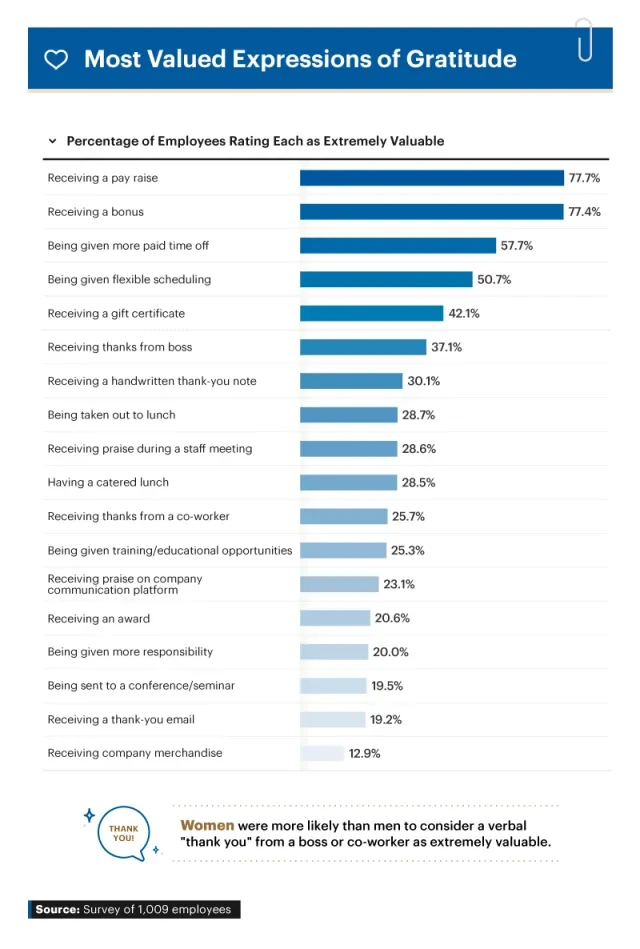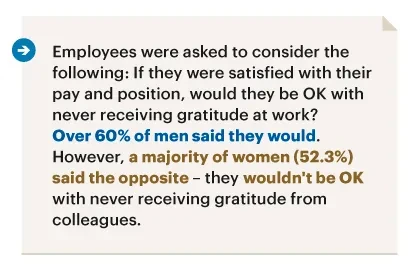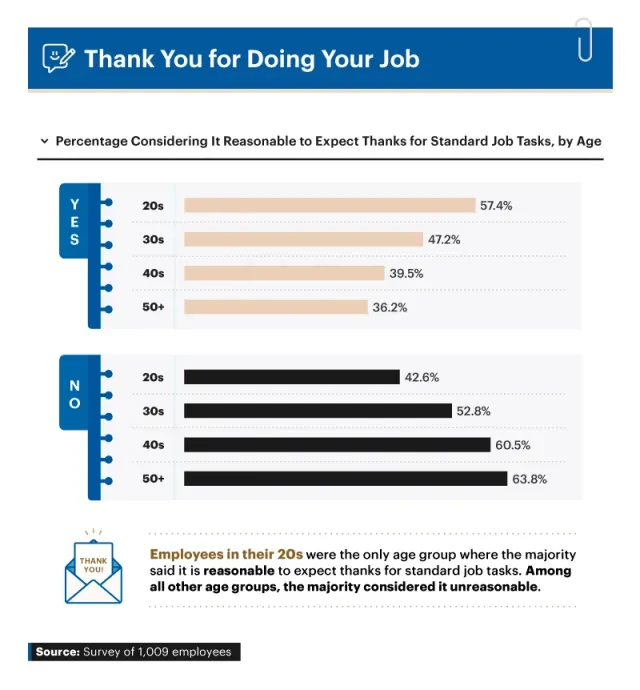- Human Resources
- Article
- 6 min. Read
- Last Updated: 11/11/2019
Cultivating Gratitude in the Office: Exploring How Showing Appreciation Impacts the Workplace

Table of Contents
Every year, on the first Friday in March, offices celebrate Employee Appreciation Day, acknowledging the achievements and dedication that workers show year-round. Part of this annual observance involves employers showing their employees gratitude for their hard work and devotion to the business.
In the workplace, showing gratitude can take many forms, from financial upgrades to workplace improvements. Some workers want to be appreciated for their success, while others don’t need constant reassurance of their solid performance. So, which methods of showing appreciation do employees want most?
In a survey of 1,009 employees, we uncovered various ways workers want to be appreciated, and how we can strive to make our offices more conducive to productivity and collaboration. Read on to see our findings.
What employees want to be thanked for at work
Expectations in the workplace can be a double-edged sword: It’s good to have a standard for how an office should operate, but every company has its own culture. One universal expectation, however, could be thanks for a job well-done.
Our survey found that over 77% of employees expected to be thanked for helping a boss or co-worker with a major task. Large, unexpected projects can derail a worker’s plan for the day or longer, so a colleague assisting with these tasks shows commitment to the business and a desire to lend a helping hand. In these cases, a simple “thank you” (at the very least) can go a long way.
In this light, we noticed that employees surveyed expect to be appreciated for going out of their way to assist others, such as working extra hours or taking on additional duties. These efforts, while beneficial and admirable, should not be long-term or permanent fixtures, so being aware of this can help you support the health of your workers.
Enabling a culture that supports gratitude can stimulate positive mental health and create happier employees, shown through the 35% of respondents who said it’s extremely motivating to be shown gratitude at work.
Giving and receiving gratitude
Our survey confirmed a bias that can appear when people perceive how they treat others and how they themselves are treated: Respondents were likely to think they show gratitude toward people at work more than they’re shown gratitude from co-workers. Thirty-three percent of employees surveyed felt they deserved more gratitude than they got at work.
We tend to look out for ourselves and recognize when we are deserving of praise. While it’s possible for someone to be self-serving and to think of his or her interests first, most of what we feel is a genuine sadness from not being appreciated: 33.5% of employees surveyed felt they deserved more gratitude than they got at work.
One way that employers can combat these feelings is to ensure the positive mental health of their employees. Nearly half of surveyed workers said they highly value gratitude from their boss. Employers can show gratitude through something as simple as a quick pep talk before a shift, which has been shown to increase employee productivity and efficiency by increasing confidence.
With some CEOs and business owners agreeing that employees who go out of their way to contribute are more likely to be recognized for their hard work, it’s important to consider these results when thinking of your own business structure.
Around 62% of employees surveyed were more likely to help a co-worker who shows them gratitude than a co-worker who is less likely to point out someone’s hard work. Creating an environment that supports good manners and recognizes good work can be beneficial.
How do employees want to be noticed and valued?
Respondents were asked which methods of showing gratitude were valuable to them. Financial incentives, such as raises and bonuses, were considered extremely valuable by over 77% of respondents, while over 57% said more PTO would be just as useful.
When it comes to pay raises and bonuses, those surveyed were more likely to favor these expressions of thanks over intangible options like a verbal “thank you” or praise. Workers seek tangible appreciation that shows through their paycheck, a fixture that should adapt and be reflective of an employee’s hard work and effort.
Still, this should not discount the value of smaller gestures, such as a thank-you card, to show someone that you care. These methods work best for more casual interactions, such as an employee showing a colleague gratitude after assisting on a big project outside of their tasks.
Employers may consider thinking critically and creatively to establish norms related to incentives, rewards, team building, extra perks, and more. Even with these efforts leading to happy employees, is gratitude still an important part of the workplace?
Should you compliment a "job well-done"?
We’ve seen that individuals who go “above and beyond” expect notice or appreciation. What about typical job tasks that employees complete which are considered part of the job, do they still deserve a “thank you” for hitting deadlines consistently and doing what is expected?
Overwhelmingly in our survey, employees said it was unreasonable to expect to be thanked for doing standard job tasks with one notable exception: workers in their 20s.
With an emphasis on gratitude training, and this issue coming into the limelight, younger generations seek one-on-one conversations and more connection to their roles, leading to a strong company culture that can foster more gratitude than in companies led by older workers.
Emotional maturity may be related to giving and accepting gratitude, so allowing younger employees to feel a strong connection to their companies can help them be more motivated to work harder for the business.
Foster strong company culture with gratitude
While it isn’t required to hang a sign and gather your workers on Employee Appreciation Day, there’s a benefit to helping employees feel happier and more engaged.
Allowing your employees to operate in the most effective ways should be a priority for employers. From raises to more PTO, there are several short- and long-term ways to express gratitude. Workers nationwide are looking to be appreciated for their hard work and are going out of their way for the sake of their companies. Those efforts should not go unnoticed.
When considering what your brand’s rewards and value-based incentives should be, take a look into how your business operates and what is best for your employees in the long run. Head over to Paychex® to help your HR department lead your employees in the right direction.
Sources
- 51 Powerfully Easy Ways to Appreciate Your Employees on Employee Appreciation Day, Inc., 2019.
- Do You Want Your Best Employees to Leave? If Not, Stop Doing These 10 Things, Inc., 2018
- Giving thanks can make you happier, Harvard Health Publishing, 2021.
- Can Gratitude Make Millennials More Successful?, Forbes, 2017.
- Do You Say 'Thank You' Often Enough at Work?, U.S. News & World Report L.P, 2017.
- Five Reasons To Write Thank-You Notes, Forbes, 2017.
- 18 Creative Ways to Show Employee Appreciation, Business News Daily, 2024.
Methodology
We surveyed 1,009 current employees about their thoughts and experiences with gratitude in the workplace. Respondents were 51% women and 49% men. Two respondents identified as nonbinary or chose not to disclose their gender. The average age of respondents was 36.2 with a standard deviation of 10.8.
Respondents were asked to identify situations at work where they expect to be thanked for their efforts. The question was a check-all-that-apply question, so the percentages will not sum to 100.
Respondents were asked how likely they would be to help a co-worker who regularly showed them gratitude versus a co-worker who didn’t. They were given the following response options:
- Much less likely
- Somewhat less likely
- Just as likely
- Somewhat more likely
- Much more likely
The responses for “somewhat more likely” and “much more likely” were grouped to get the percentage represented in the final data visualization.
Respondents were asked to rate how much they valued gratitude from people at work. They rated their value on the following scale:
- No value
- Slightly value
- Somewhat value
- Moderately value
- Extremely value
The percentage who said they “extremely value” gratitude were those represented in the final data visualization.
Respondents were also asked to rate expressions of gratitude based on how valuable they deemed them. In our final visualization of the data, we showed the percentage of people rating each expression of gratitude as extremely valuable.
Limitations
The data we are presenting rely on self-reporting. Common issues with self-reported data include exaggeration, telescoping, attribution, and selective memory. For example, when asked how often they show gratitude toward their co-workers, respondents could have exaggerated their frequency of doing so as part of a self-serving bias.
Fair use statement
If someone you know would benefit from our findings, you’re free to share this study with them for any noncommercial reuse. Be sure to link back here so that they can read the full study and its methodology. This also gives credit to our contributors for their hard work.
Tags

